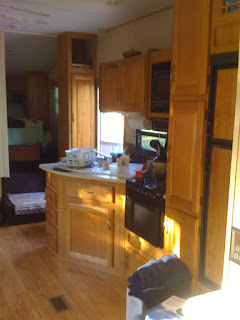The Association of Science-Technology Centers includes hundreds of science and nature centers, museums, zoos, aquariums, gardens, and planetariums. Membership at one center generally gets you free admission to the hundreds of others in the U.S. through the ASTC passport program. If there is any organization that caters more directly to the needs of a "roamschooling" family, we haven't found it.
We are members of the Sternberg Museum of Natural History in Hays, Kansas. The Sternberg is a great example of the value of an ASTC membership. It's a relatively small museum with some fine fossil specimens, including the world-famous "fish-within-a-fish" and others from the time when Kansas was part of a great inland sea. Their animatronic dinosaur diorama always thrills the kids. My favorite part of the Sternberg is the well-stocked and well-maintained "Discovery Room" -- chock full of nature activities, books, toys, and specimens appropriate to all ages. If we lived in Hays, I'm sure we would visit weekly, and never run out of interest.
Since the first year we joined the Sternberg, we have visited at least a dozen other ASTC member institutions across the country, and we now plan our travel to include our favorites, such as The McWane Science Center in Birmingham, Alabama; ¡explora! in Albuquerque, New Mexico; and Exploration Place in Wichita, Kansas, where yesterday we crawled through a model of a blue whale's heart in the traveling exhibit, Whales | Tohorā.
We have encountered exhibits which illustrate concepts in all the sciences, from anthropology through zoology. Music, art, civil engineering, history, robotics, weather ... I can't think of a subject that we haven't seen addressed in these centers. (Well, they may be light on literature, says the English major, with a wink.)I highly recommend the ASTC passport program to anyone with children*, whether you expect to fly to a single destination in your year of membership, drive across the country and stop at several museums on the way, or even just take a few trips to your local science center.
* Note: Adults who are interested in enjoying the benefits of the ASTC passport program should be aware that some children's science centers will not admit adults without children during regular daily hours, so check the policies of the member centers you intend to visit.
* Note: Adults who are interested in enjoying the benefits of the ASTC passport program should be aware that some children's science centers will not admit adults without children during regular daily hours, so check the policies of the member centers you intend to visit.


















